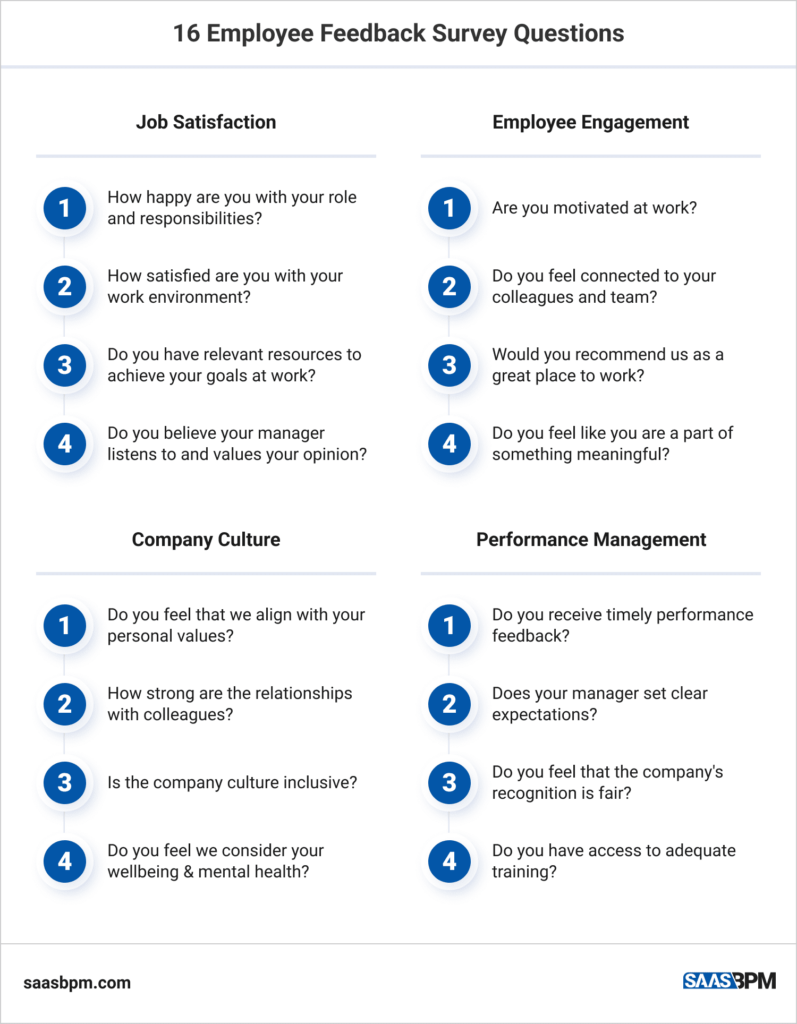When it comes to employee satisfaction at work, many managers struggle to determine the boundaries between a happy and a fed-up-with-their-job team member. The reason behind that is simple – they don’t ask their staff objective questions; rather, they rely on what they see on the surface. And that’s where a good employee feedback survey comes into play.
Issues that employees may have with the workplace culture, management, or the job itself often remain hidden. In fact, according to Gallup, just 15% of full-time workers worldwide feel engaged with what they do professionally. Also, in the US alone, just 21% of employees feel that they are being managed in a motivating way.
As statistics also show, most of the workforce don’t feel satisfied with their workplace and therefore, perform their duties on autopilot. This can be easily mistaken with laziness, not understanding the work process or just a lack of enough expertise for the role. However, more often than not, it is simply a case of not enough communication and misinformation.
Therefore, a good manager would invest time into crafting a thorough employee feedback survey and act on the answers they receive. Read on to find out how.
What Is The Importance of Employee Feedback Surveys?

The importance of employee feedback surveys cannot be overstated in today’s modern workforce. Firstly, they are an excellent way to discover what your team thinks about the company’s strengths, weaknesses, and areas for improvement, which is essential for moving the organization forward.
Additionally, employee feedback surveys provide important insights into employee satisfaction, engagement, and overall morale. All these can help to address any concerns that may have gone unnoticed.
Actively listening to what your workers have to say can promote transparency and open communication between management and staff. Issuing an employee feedback survey regularly shows that the company values its employees’ opinions, which can foster a sense of trust and loyalty.
Furthermore, this way you can identify any issues, big or small, and encourage employees to share their feedback anonymously without fear of retribution.
Another benefit of an employee feedback survey is that they can be used to track performance over time. By conducting surveys at regular intervals, it’s possible to see if changes made have had a positive or negative impact on employee morale or satisfaction.
Finally, employee feedback surveys can help to attract and retain top talent. In today’s competitive job market, companies must strive to offer a satisfying work experience. By demonstrating a commitment to employee feedback and valuing employees’ opinions, companies can stand out as excellent places to work.
16 Employee Feedback Survey Questions
When designing employee feedback surveys, it’s essential to ensure that the questions are comprehensive, insightful, and unbiased. The right questions can elicit valuable and honest feedback from employees, leading to meaningful insights about the workplace.
Here are some sample employee feedback survey questions that companies can use to gain valuable insights from employee feedback.

Job Satisfaction Questions
Job satisfaction questions are essential as they gauge employees’ general contentment and happiness at work. This way, business owners and managers can better spot areas where the company is succeeding and other areas that require improvement. Examples of job satisfaction questions include:
- How happy are you with your role and responsibilities?
- How satisfied are you with your work environment?
- Do you have relevant resources to achieve your goals at work?
- Do you believe your manager listens to and values your opinion?
Employee Engagement Questions
Employee engagement is vital as it measures an employee’s excitement, enthusiasm, and emotional investment in their work. High engagement rates typically correspond to better job performance and outcomes. Here are some examples you can include in your employee feedback survey:
- Are you motivated at work?
- Do you feel connected to your colleagues and team?
- How likely are you to recommend our organization as a great place to work?
- Do you feel like you are a part of something meaningful?
Company Culture Questions
A positive company culture can cultivate happy employees, foster communication, and inspire a sense of belonging. Culture survey questions could include:
- Do you feel that our organization aligns with your personal values and ethics?
- How strong are the relationships between team members?
- Is the company culture inclusive and accepting of everyone’s unique perspectives?
- Does the company consider employees’ well-being and mental health support?
Performance Management Questions
Performance management questions are essential as they reveal the effectiveness of the company’s management and evaluation processes. Examples of performance management questions include:
- Do you receive timely and relevant feedback on your performance?
- Does your manager set clear expectations and provide adequate support?
- Do you feel that the company’s recognition and rewards programs are fair and sufficient?
- Do you have access to adequate training and development opportunities?
Key Takeaways
In summary, an employer feedback survey is a vital tool for understanding how to serve your employees and make them as productive as possible. Asking the right questions can help you capture valuable insights on job satisfaction, employee engagement, company culture and performance management.
Taking the time to think through each of these 16 questions will arm you with the knowledge needed to revolutionize your team and organization – not only in the short-term, but also well into your long-term strategies and goals. So what are you waiting for? Start crafting a survey that captures relevant information, integrate it into your business processes and create actionable items.
Looking for more ways to motivate your employees to collaborate better? SaaS BPM can help optimize your workflows – giving you better control over not just your end results, but also making sure that they align with organizational objectives at every step along the journey! Exciting times are ahead!

